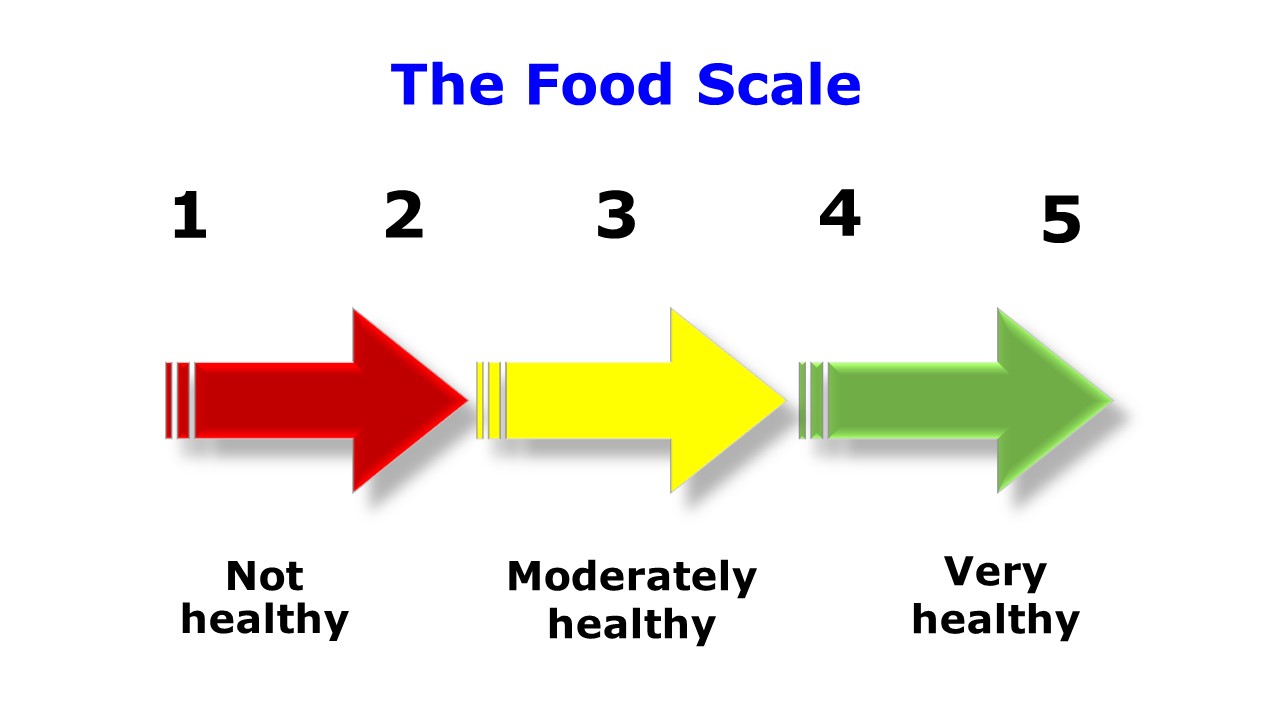
What affects the ranking of food on the scale?
The ranking is somewhat subjective but here are some things to consider:
- Nutrient density. The amount of nutrients (i.e. vitamins and minerals) does the food have per calorie?
- Total calories.
- Protein amount and type.
- Carb amount and type.
- Fat amount and type.
- Additives, fillers, sweeteners, dyes, nitrates and sulfates.
- Some foods are better for you than others at certain points in the day. I.e. we need more simple carbs after workouts but complex carbs at other times.
- How far displaced is the product from its natural form? How processed is it?
As far as weight loss or weight gain is concerned, the primary focus is the number of calories. Calories burned versus calories eaten.
Beyond calories, the rest of the matter is slightly subjective, but here are some objectives to be mindful of:
- Vitamins and minerals are highly valuable to healthy living. Typically, the greater number of vitamins and mineral the better for you. However, the best vitamins and minerals come in their natural state. This means they have not been tampered with through processing and thus can be more readily absorbed and utilized by the body, even in smaller amounts. Note: some processed products may have more vitamins than other “natural” products because the food company had previously stripped the vitamins during processing and then re-added. The re-added vitamins are not as beneficial as the natural but are still better than none.
- Greater amounts of protein in a food is ideal because many people are deficient in high quality protein in their diet. The protein can be animal or plant-based, but if you’re lactose sensitive or intolerant, moderate the amount of whey and casein protein (derived from milk).
- Carbs are tricky. Low-carb foods are not always the best. For instance, high-endurance competitors need high carb foods in their diet to function optimally. The ranking of the quality of food on the scale regarding carbs depends on your body goals and energy output. In general, complex carbs like whole grains, rice, oats, beans, quinoa, corn, and potatoes should dominate your carb intake. Fruits are simple carbs but are loaded with vitamins, so they are okay. The best time to eat carbs will be post-workout (especially simple carbs) because they will increase the rate and efficiency of restoration. High carb foods normally do not bode well for weight loss. Thus, a high carb food for a person wanting to lose weight will rank lower, but for post-workout or an endurance athlete, a high carb food may rank higher.
- Fatty foods have their place if they are eaten in moderation and predominately unsaturated. To best understand fat intake and the ranking thereof, just reverse the example for carbs: a person interested in weight loss will thrive on a higher fat (and protein) diet, and an endurance athlete will suffer.
- Beware of trigger foods! Although a food may rank high on the scale in the health department, this particular food may be a trigger for you to overindulge.
- A food may be ranked higher on your scale versus another’s. For instance, you may be lactose intolerant while other people are not. Therefore, dairy products should rank lower on your scale than theirs. Or like the carb food example mentioned above.
- The more additives, fillers, etc. a product contains, its value is reduced. Many additives are like adding slight toxins to the body to increase texture, taste, or preservation. However, it’s almost impossible to completely rid your diet of such without being constantly consumed with food. The best protocol is to lessen the amount to the best of your ability as often as you can, but you may splurge occasionally as long as occasionally doesn’t morph into frequently.
- The last consideration is the amount of processing. If the food has changed dramatically from is natural state, then the lower ranking it will receive. E. g. a potato changes from the spud to instant mashed potatoes (flakes). Of course, with each level of processing the rank decreases because the natural nutrients diminish and the subsequent increase in other “chemicals.”
Remember, just because a food may rank as a 5 on the scale doesn’t mean you can overindulge without any harmful side-effects. Always be mindful of what you eat, in quality and quantity.
